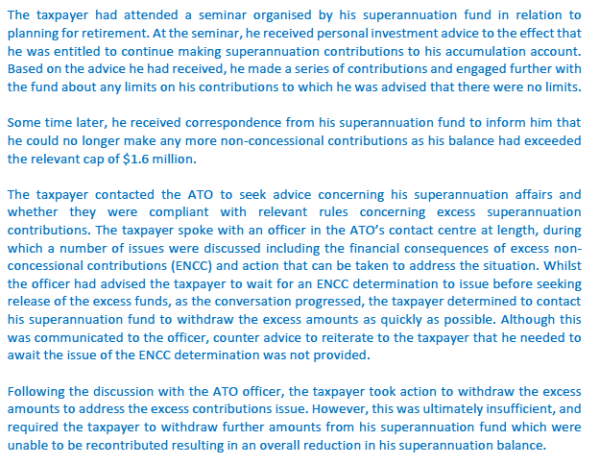How a super fund retirement planning seminar went wrong

The Inspector General of Taxation has cited personal investment advice provided during a superannuation fund seminar as underscoring the complexity of the superannuation taxation regime and the misunderstandings which arise.
The Inspector General cited the experience of one superannuation fund member and taxpayer as a case study about one of the recurring themes which have evolved even when advice has been sought.
The Inspector General cited the following case study:

The Inspector General’s submission to the Senate Economics said the case study highlighted both the complexities of the superannuation system and “how, notwithstanding advice from multiple authoritative sources, the taxpayer is ultimately adversely impacted”.
“In this instance, notwithstanding the IGTO’s investigation and findings about the inconsistent advice that was provided by the ATO, no remedial action was taken to restore the taxpayer to the position he would have been in if the advice provided had been clear an unequivocal,” the Inspector General’s submission said.
The submission went on to say that retirement choices and options were not readily understandable by many taxpayers without the need for further professional financial advice and added “this is particularly so for taxpayers from culturally and linguistically diverse backgrounds”.











This is typical of the sort of illegal advice union super fund sales reps and call centre operators give all the time, while regulators turn a blind eye. Jones wants to legalise it just in case regulators start doing their job properly. That’s his real agenda with QAR.
Uneducated, Unqualified, Back Packer Call Centres & Seminars proudly brought to you by Industry Super, Jonsey & ASIC.
What could possible go wrong in the most complex retirement system of Australia ??
Name and shame.
This is an excellent example of the ways in which “personal financial advice” is misunderstood – both by the public and by people within organisations. Both the super fund and the ATO officers should have confirmed that they CANNOT provider personal financial advice. This can ONLY be provided by a suitably registered financial advisor.
Both officers should have pointed out to the super member that they could not undertake sufficient investigation to provide personal financial advice. Furthermore, they should have pointed out that there is a fee payable for personal financial advice, but they can shop around to find an advisor who might provide that advice for a fee acceptable to the member.
And they should have confirmed to the member that after receiving the officer’s GENERAL and FACTUAL advice, should they decide to proceed with an action without obtaining personal financial advice, then they take on the risk that such action may not be appropriate to their circumstances.
That is the way the system is supposed to work.
In this case, MLC vs Evatt would/should be available for the member’s redress. The member could reasonably expect that the officers would act in their best interest; that they would be capable of providing advice.
The failure of figures of authority to understand and act on existing legislative frameworks is what reduces the value of financial planners in the public eye.
Why is the “taxpayer” trying to do all of this complex advice on the cheap…. You get what you pay for. The ATO told the taxpayer to wait until the ENCC and they didn’t. The client sounds like a nightmare.
Interesting that some comments jump straight to the assumption that this case study super fund is an industry fund. In my long experience it’s just as likely to be a retail, public sector or even corporate fund.
The odds are $1.00001 that it was an industry fund. Retail funds will direct these queries to advisers who are their true customers after all. Industry funds can’t do that, so need to skirt the line between general and personal advice. I just don’t see the incentive for a retail fund to do this unless a rogue employee was involved. In this case, the assumption is a safe one.
If it wasn’t a union fund, they would have been named and shamed already. Union funds are more likely to do the wrong thing, because they know regulators are unlikely to take meaningful action. Even when regulators make token efforts to rein in the excesses of union funds, it is done with minimum public exposure, and the force of a wet lettuce leaf.
Well, seems the conspiracy theories have been derailed by Greg, in that last time I checked, Super SA was a govt fund, not a ‘union’ fund
No conspiracy theories. Nobody said in the article said that it was an Industry Fund….. the comments from the Commissioner state the person said there were no limits. This is typical of a Legislated State Govt Fund where annual caps do not apply and until recently the cap was $1,60million as a lifetime limit only. But you already know that? So why bring it up?
This sounds like Supersa. Myself and another Adviser visited Supersa on behalf of clients regularly and almost in every occasion super conts were discussed, taxation benefits, warnings (as well) and also pre retirees pensions available and how they work. On bringing concerns up to staff members, they said they are confident this is not advice. After a few visits like this, Supersa banned advisers from attending the front counter and said from that point on, they would only serve advisers by phone or email. Reason given? Info provided to clients in front of advisers, rather than waiting Supersa members who could also listen was not private.